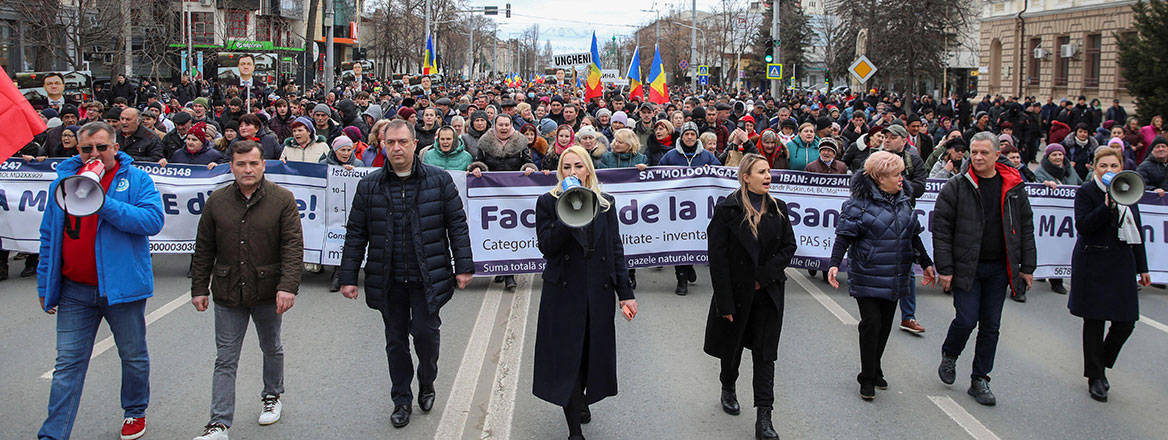State Collapse, Stray Missiles and Strategic Meddling: Russia in Moldova
While attention remains focused on the Ukraine war, Russia’s foreign policy approach and interventionist political actions in Moldova may be overlooked as a potential site of competition between Russia and NATO.
Sandwiched between Ukraine and Romania and with a turbulent history of weak governance, economic turmoil and social instability, Moldova is a country highly vulnerable to external political events. Russia has always had political and strategic interests in Moldova, but aside from a few economic links and maintaining a stake in supporting pro-Russian political figures, the Kremlin in previous years had spent very little effort in furthering its agenda there. But since Russia’s invasion of Ukraine and the shifting of security architecture in Europe, Russia’s interests in Moldova seem to have sharpened.
With high inflation, gas cuts and a government that collapsed and reconfigured in February this year, Moldova’s political and economic weaknesses present an opportunity for Russian intervention. Stray Russian missiles from the Ukraine war entered Moldovan airspace in February, and while it is unlikely this was a deliberate act, it highlighted the risks of spillover to Moldova’s territory.
Before the war, Moldova’s strategic significance to Russia was minimal. But recent events have returned Moldova to the agenda, and it is becoming the focus of a strategic battle between NATO allies and Russia.
Russia’s Pre-War Interests
Before Russia’s invasion of Ukraine, Moldova had little geopolitical importance for Moscow: it is not geographically contiguous with Russia, has few financial assets or raw materials to act as a trade partner, and has a relatively low international profile.
Instead, Russia’s interests were mainly focused around retaining control over the breakaway territory of Transnistria and maintaining its ‘peacekeeping’ mission there, a very small (around 1,200) contingent of Russian soldiers that are not combat-ready. The Moldovan government’s own corrupt practices and weak leadership, in a country with high protest potential, have resulted in relatively frequent government collapses over the past 20 years – it is not unusual for governments to fail to complete their terms of office. These processes have meant that Moldova has remained caught in a sort of liminal zone between Europe and Russia, having deep alliances with neither.
Before the war, Russia did invest somewhat in Moldova’s left-leaning political leaders, such as the former leader of the Party of Socialists and former president (2016–2020) Igor Dodon – who was under house arrest from May to November 2022 for corruption and receiving funding from oligarchs linked to the Kremlin. As president, Dodon presented himself as the only Moldovan politician capable of having the ear of President Vladimir Putin, maintaining that closer ties with Moscow would guarantee favourable gas prices and economic stability. But while Russia is widely thought to have continued to finance Dodon and has certainly supported him publicly, the Kremlin’s pre-war approach has not expressly attempted to reinstall Dodon after his ousting. Instead, figures such as Dodon were a useful tool for Russa to disrupt Moldova’s political system, ensuring any deeper ties with the EU would remain off the agenda.
The Moldovan government’s support for Kyiv and acceptance of many Ukrainian refugees – especially children – has been a source of irritation for Moscow
The victory of Moldova’s pro-EU President Maia Sandu and her Action and Solidarity party in the presidential (2020) and parliamentary elections (2021) was mostly due to the Moldovan diaspora, a community of around 1.2–2 million people, who disproportionally voted for her. Domestically, her victory was narrow, with a margin of just 27,000 votes. Despite this, while Dodon at the time encouraged the Moldovan diaspora in Russia (around half a million people) to vote for pro-Russia candidates, the Kremlin itself did not make a concerted effort to push the Moldovan diaspora to the polls, even though this might have been decisive for the campaign.
Tipping Points
But the war has changed the security arrangements in central Europe, and therefore Russia’s foreign policy toward Moldova.
Ukraine’s territory has always given Moldova some practical distance from Moscow. But in the early months of the war, as the Russian offensive coalesced around the southern Ukrainian city of Odesa, there were concerns that Transnistria (and Moldova itself) could be dragged into the conflict, either by accident or by design. Now that Russia’s war aims have been significantly downscaled, from regime change in Kyiv and capturing land corridors across the south to settling for more modest chunks of Ukrainian territory in the east, Moldova’s territorial significance as a part of Russia’s war effort might have declined.
But with an economy dependent on remittances from abroad and very little foreign investment, Moldova’s economy remains highly vulnerable to market changes. Russia’s bombing of energy infrastructure in Ukraine has had a concomitant effect on Moldova, with rolling power blackouts throughout late last year. Then, in November 2022, Russia’s state-controlled Gazprom threatened to reduce gas flows to Moldova by a third, which it transports via Ukraine. However, Gazprom has since backtracked on this threat, maintaining that it has the right to halt flows if Moldova fails to make agreed payments in future. At a time when Russia needs clients for its gas, this is likely a move by Gazprom to ensure gas flows continue, while maintaining the threat of cancellation should Moldova shift too closely to European structures.
Subtle Shifts
Events in the past month appear to have accelerated swiftly. The Moldovan government’s support for Kyiv and acceptance of many Ukrainian refugees – especially children – has been a source of irritation for Moscow. But perhaps even more significantly, the breakaway region of Transnistria, which is loyal to Moscow, has walked a careful line on the war; its leadership has shied away from taking a side, and events in Transnistria in recent weeks suggest the region is coming under pressure to choose its allegiance.
In early March, Transnistria’s leadership maintained that it had foiled an attack on its own senior officials, which it attributed to the Ukrainian security services (SBU) – a claim that Russia has also made. Several days later, Transnistria adjusted the story, claiming instead that a visiting OSCE delegation in February had been the target. While accusations against the SBU do not fit with Ukraine’s approach to the war thus far, there have been suggestions that this could have been a message from Moscow – Transnistria is a convenient asset for Russia to dial instability up or down, to extract concessions from Moldova and to prevent it from moving too close to Europe.
To this end, the Russian media has repeatedly claimed that Ukraine is planning an offensive on Moldova with the aim of accessing the Kolbasna arms depot in Transnistria, and has maintained that Russia would respond should Transnistria come under threat. There has been concern that Moscow might be framing its supposed security concerns around Transnistria as a potential false flag operation, and an excuse for Russia to boost its troop deployment there as a ‘deterrent’.
Moscow appears to be ramping up its foreign policy tools in Moldova, framing it as a highly unstable country incapable of receiving EU membership
Moldova’s candidacy status as a potential EU member – a bid that has been accelerated since the war – has also prompted an uptick in Russian propaganda there. Although Kremlin-controlled media have always maintained some presence in Moldova, in recent months there does appear to have been a concerted effort on social media and television from the Russian side to promote the Kremlin line more strongly. Then, in February, President Sandu publicly accused Russia of attempting to foment civil unrest with the aim of overthrowing the Moldovan government, an allegation that Ukrainian President Volodymyr Zelensky had made a few days before.
Russia’s efforts appear to be targeted across the country – most recently, on 17 April, the Moldovan authorities barred entry to a Russian delegation, which they maintained had arrived in Chisinau to garner support for a pro-Russia political candidate to lead Moldova’s semi-autonomous region of Gagauzia in the upcoming elections. Moldova has accused Russia of attempting to politically destabilise the country, and while Moscow denies this, the seniority of the delegation suggests that efforts to intervene in Moldova’s political affairs have been sanctioned at high levels.
Over the past few months, pro-Russia opposition parties have held frequent rallies, specifically calling for the government to resign. Moldova’s Chief of Police has maintained that Russia’s Federal Security Service is behind these destabilisation activities, including directly financing protesters. Some of the protests appear to have been organised by Ilan Shor, the former mayor of Orhei, who is now in exile in Israel – he was sanctioned by the US Treasury in 2022 for attempting to destabilise the Moldovan government and prevent it from joining the EU.
Counterattack
Mindful of Russia’s efforts, the EU announced in early March that it would send a civilian security mission to Moldova later this year, an act that Russia will likely interpret as a serious risk to its interests. While the EU does not have significant powers in Moldova and is not a military alliance, Russia views the EU as a security structure rather than a political one.
Other countries have taken note of Moldova’s potential for instability, and the country has become a new locus of competition between NATO allies and Russia. The US has specifically sanctioned Russian individuals over attempts to destabilise Moldova, provided around $265 million in emergency funds to shore up Moldova’s struggling economy, and pledged further funds to assist with the energy crisis. Then, as part of its recently announced refresh of its Integrated Review, the UK pledged to boost engagement with Moldova to counter Russia’s influence there. This includes significant funding – £10 million has been apportioned to support economic and government reforms in Moldova, on the premise that strengthening Moldova’s own resilience might make it less vulnerable to Russia’s designs. In this vein, Foreign Secretary James Cleverly visited Moldova on 16 March, maintaining that the best way to protect Moldova was to help Ukraine defend itself against Russia.
Although the actual military threat to Moldova from Russia is low, Moscow does appear to be ramping up its foreign policy tools there, framing Moldova as a highly unstable country incapable of receiving EU membership. Destabilising Moldova could also be an attempt to distract the neighbouring Ukrainian forces, whose leadership may feel the need to gather troops on the border to head off potential security threats. Even if the pro-Russia protesters in Moldova do not succeed, it is likely immaterial to Moscow – removing the Moldovan government itself is of little strategic value to the Kremlin. A pro-Moscow government in Moldova would be highly unlikely to affect Russia’s most pressing concern – the outcome of the war in Ukraine.
The views expressed in this Commentary are the author’s, and do not represent those of RUSI or any other institution.
Have an idea for a Commentary you’d like to write for us? Send a short pitch to commentaries@rusi.org and we’ll get back to you if it fits into our research interests. Full guidelines for contributors can be found here.
WRITTEN BY
Emily Ferris
RUSI Senior Associate Fellow, International Security
- Jim McLeanMedia Relations Manager+44 (0)7917 373 069JimMc@rusi.org


